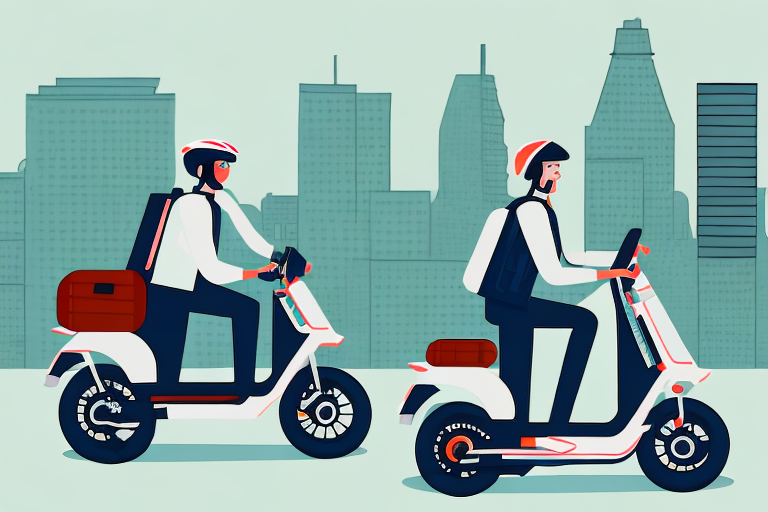Exploring the Benefits and Challenges of Working as a Courier
Courier work offers a unique blend of flexibility, independence, and the opportunity to be a pivotal part of the logistics network that keeps our economy moving. However, like any career path, it comes with its own set of challenges. This article delves into the multifaceted role of couriers in today's economy, the burgeoning demand driven by e-commerce, essential requirements and qualifications, the pros and cons of different employment models, and strategies for success in this dynamic field. Additionally, we will explore future trends shaping the courier industry.
Understanding the Role of a Courier in Modern Logistics
Couriers are essential to the efficient functioning of today’s economy, particularly in the realm of fast-paced deliveries and timely service. Their primary responsibility is the prompt and secure transportation of goods, ranging from documents and packages to perishable foods and medical supplies.
Key Responsibilities
- Timely Deliveries: Ensuring items reach their destination within the promised timeframe.
- Handling Sensitive Materials: Managing deliveries that may require special care or confidentiality.
- Customer Interaction: Providing excellent service and addressing any delivery concerns.
In the e-commerce landscape, couriers are the backbone of customer satisfaction, delivering products directly to consumers and facilitating the growth of online businesses.
The Growing Demand for Couriers in E-commerce
The rise of e-commerce has significantly amplified the demand for courier services. According to a Statista report, global e-commerce sales are projected to reach $6.54 trillion by 2023, underscoring the expanding need for reliable delivery solutions.
Factors Driving Demand
- Increased Online Shopping: More consumers prefer the convenience of online purchases.
- Same-Day Delivery: The expectation for faster delivery times pushes the need for more couriers.
- Business Growth: E-commerce businesses expanding their reach require scalable delivery options.
Moreover, the diversification of services—from standard deliveries to specialized ones like grocery and pharmaceutical deliveries—has broadened the scope and opportunities within the courier industry.
Becoming a Courier: Requirements and Qualifications
Embarking on a career as a courier requires meeting specific criteria to ensure reliability and efficiency.
Essential Requirements
- Valid Driver’s License: A clean driving record is often mandatory.
- Reliable Vehicle: Depending on the job, this could range from a bicycle to a van.
- Background Check: Ensuring trustworthiness and safety in handling deliveries.
Desired Qualifications
- Physical Fitness: Ability to handle packages of varying weights.
- Time Management: Efficiently organizing deliveries within set timeframes.
- Communication Skills: Interacting effectively with customers and dispatchers.
Some companies may also require couriers to have access to smartphones or GPS devices to facilitate route planning and delivery tracking.
Independent Contractor vs. Delivery Company: Weighing the Pros and Cons
Choosing between working as an independent contractor or being employed by a delivery company is a pivotal decision for aspiring couriers.
Independent Contractor
- Pros:
- Greater flexibility in choosing work hours and clients.
- Potential for higher earnings based on the volume of deliveries.
- Cons:
- Responsibility for business expenses and taxes.
- Inconsistent income streams, especially when starting out.
Delivery Company Employee
- Pros:
- Steady income with potential benefits like health insurance.
- Access to company resources and training programs.
- Cons:
- Less flexibility in scheduling and work assignments.
- Potential limitations on earnings growth.
Choosing the right model depends on individual preferences, financial goals, and lifestyle considerations.
Strategies for Managing Multiple Deliveries Efficiently
Effectively handling multiple deliveries is crucial for couriers to maximize productivity and earnings.
Route Optimization
Utilizing route planning tools and apps can help minimize travel time and fuel consumption. Services like Google Maps and Waze offer real-time traffic updates and alternative routing options.
Prioritization
Identifying urgent deliveries and organizing tasks based on deadlines ensures timely service. Implementing a system to categorize deliveries by priority can streamline operations.
Organization Tools
Keeping meticulous records of delivery details—such as addresses, contact information, and special instructions—can prevent errors and enhance efficiency. Digital tools like Trello or dedicated courier management software can be invaluable.
Ensuring Safety on the Road: Mitigating Common Risks
Safety is paramount in courier work, given the extensive time spent driving and the potential hazards associated with transportation.
Vehicle Maintenance
Regular servicing and inspections of vehicles prevent malfunctions and reduce the risk of accidents. Adhering to maintenance schedules is essential for reliable performance.
Adherence to Traffic Laws
Strict compliance with speed limits, signaling, and other traffic regulations minimizes accident risks and promotes safe driving habits.
Awareness and Avoiding Distractions
Staying alert and avoiding distractions—such as mobile phone usage while driving—enhances situational awareness and reaction times, crucial for preventing collisions.
Enhancing Customer Service Through Effective Communication
Exceptional customer service distinguishes successful couriers and fosters repeat business.
Clear Communication
Providing accurate delivery estimates and promptly informing customers of any delays builds trust and reliability.
Professionalism
Maintaining a courteous and respectful demeanor during interactions ensures positive customer experiences.
Problem Resolution
Efficiently addressing and resolving any delivery issues or customer complaints can mitigate negative feedback and enhance reputation.
Maximizing Earnings: Efficiency and Speed Strategies
Increasing efficiency and delivery speed directly correlates with higher earnings for couriers.
Technological Integration
Leveraging technology for route optimization, delivery tracking, and time management can significantly enhance productivity.
Expanding Service Offerings
Offering additional services—such as oversized deliveries, express shipping, or specialized handling—can attract a broader client base and command higher fees.
Building Client Relationships
Developing strong relationships with clients can lead to repeat business and referrals, providing a steady income stream.
The Future of Courier Work: Embracing Technological Advances and Industry Trends
The courier industry is poised for transformative changes driven by technological innovations and shifting consumer expectations.
Automation and Robotics
Advancements in autonomous vehicles and drone technology promise to revolutionize delivery methods, potentially increasing efficiency and reducing labor costs. Companies like Uber and Amazon are at the forefront of integrating these technologies.
Environmental Sustainability
The push for eco-friendly delivery solutions has led to the adoption of electric and hybrid vehicles, as well as initiatives like bicycle couriers in urban areas to reduce carbon footprints.
Data-Driven Decision Making
Utilizing big data and analytics allows courier companies to optimize operations, predict demand trends, and enhance customer satisfaction through personalized services.
In conclusion, a career as a courier offers significant opportunities amidst the evolving landscape of logistics and delivery services. By staying informed about industry trends, adopting efficient strategies, and prioritizing safety and customer service, couriers can achieve sustained success and growth in this dynamic field.




















